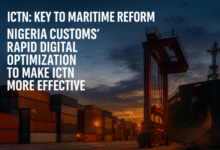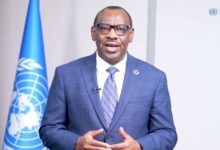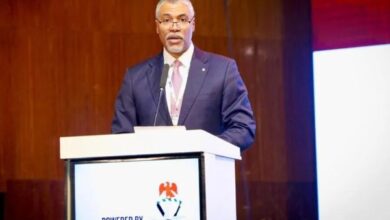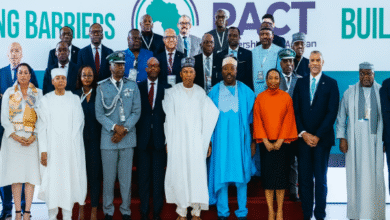FG vows to tackle regulatory, bureaucratic bottlenecks hindering exporters – Trade Minister
“While the economic reforms may have been tough, the country’s economy is already turning the corner..."

Dr Jumoke Oduwole, Minister of Industry, Trade and Investment, has expressed the Federal Government’s determination to address the regulatory and bureaucratic bottlenecks and challenges exporters faced to drive a thriving export ecosystem.
The Minister made this known at an export stakeholders consultation engagement on Tuesday in Lagos.
She said that the ministry was committed to re-establishing and reinvigorating commodity exchange, particularly as Nigeria journeyed towards an export-driven economy by addressing bureaucratic bottlenecks among other actions.
Singapore set to strengthen bilateral trade ties with Nigeria
According to her, all agencies under the ministry of industry, trade and investment would be supported to drive exports, particularly of services, which is a lowest hanging fruit.
“Nigerian youths would have the opportunity to earn foreign exchange while living in Nigeria by exporting their services such as digital trade, and Nigeria is going to be a leading force in that regards.
“There is a lot of work ahead no doubt, but President Bola Tinubu is committed to this and has given the ministry a matching order to go ahead to enhance the country’s trade.
“While the economic reforms may have been tough, the country’s economy is already turning the corner and it takes everybody’s commitment to make this economy work,” she said.
Oduwole also called for collaboration among all agencies to address issues of miscommunication, operation in silos, overlapping duties as well as bureaucratic bottlenecks among others.
Amb. Nura Rimi, Permanent Secretary of the ministry, said that the event was geared towards fostering inclusive engagement to advance Nigeria’s economic diversification agenda and expand its export capacity.
Rimi said that the ministry was committed to deliberating on the challenges and opportunities that shaped the country’s export landscape.
He said that as a nation, the importance of exports in driving economic growth, creating jobs, enhancing foreign exchange earnings, and positioning Nigeria in the competitive global marketplace was recognised.
According to him, the ministry remains steadfast in its mandate to create enabling policies and frameworks that enhance export competitiveness.
“Through the feedback and insights from this engagement, we aim to fine-tune interventions, tackle critical points such as access, regulatory bottlenecks, infrastructural constraints and ensure alignment with global best practices,” he said.
Mrs Folashade Ambrose-Medebem, Commissioner, Commerce, Cooperatives, Trade and Investment, Lagos, said that the state’s economic strategy closely aligned with the Federal Government’s goal of diversifying the Nigerian economy.
She said that in alignment with global trends, Lagos had introduced digital tools to enhance the efficiency and sustainability of cooperatives.
She said that the tools enabled better record-keeping, transparency, and decision-making, ensuring that cooperatives remained competitive in a rapidly changing economic environment.
Ambrose-Medebem said that the state, by focusing on non-oil sectors such as agriculture, manufacturing and technology, was playing a leading role in reducing Nigeria’s dependence on crude oil exports.
“Our role is clear; to create an enabling environment where businesses can thrive, support trade competitiveness, ensure the sustainability of cooperative societies, and expand Lagos’ reach in the global marketplace.
“With the unwavering support of Gov. Babajide Sanwo-Olu, we have made remarkable strides in fostering trade and investment, empowering exporters and aligning our initiatives with the Federal Government’s diversification goals,” she said.
The Commissioner revealed that earlier in the year, the state embarked on an ambitious export training programme, equipping over 2,000 exporters with the skills, knowledge, and resources to penetrate global markets.
According to her, the programme addressed challenges such as compliance with international trade regulations, export financing, and product quality standards.
She said that building on the success of the training programme, Lagos State was set to launch its export readiness programme in January 2025.
Ambrose-Medebem said the initiative would focus on capacity building, export readiness assessments, and facilitating market linkages for businesses looking to expand internationally.
Also, Bashir Adeniyi, Comptroller General, Nigeria Customs Service, pledged to address regulatory overlaps at the ports and tackle documentation procedures that created problems for exporters.
Adeniyi said that the potentials in export called for unity in ensuring that the vision of Federal Government to turn the country into a huge trade hub succeeded.
He said that the customs service would never allow its processes and procedures constitute an impediment to the success of exports.
He added that the service would not allow corruption and corrupt practices stand in the way of export development in Nigeria.
“In 2025, most port operations would be automated, even as we push export numbers up to increase the country’s foreign exchange earnings and translate to real economic development for Nigeria.
“We call for transcontinental customs administration cooperation to further drive trade, particularly under the Africa Continental Free Trade Area (AfcFTA),” he said.











